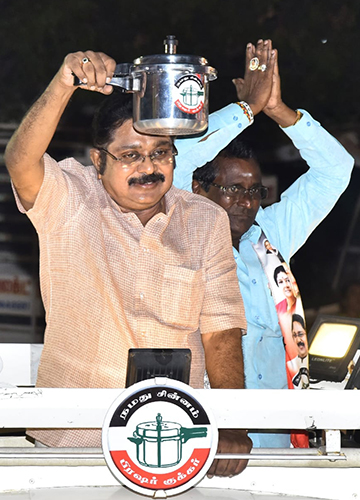ON MARCH 3, when expelled AIADMK general secretary V.K. Sasikala announced her decision to withdraw from active politics, her nephew T.T.V. Dhinakaran was taken aback. Speaking to the media outside Sasikala’s bungalow in Chennai, Dhinakaran admitted that he did not see it coming. Two days later, when key allies of Sasikala and her Mannargudi clan resolved to go with the AIADMK and the DMK in the upcoming elections, Dhinakaran, who heads the Amma Makkal Munnetra Kazhagam (AMMK), said that he was staying put with his new allies—the All India Majlis-e-Ittehad-ul-Muslimeen of Asaduddin Owaisi, the Social Democratic Party of India and the Desiya Murpokku Dravida Kazhagam led by actor Vijayakanth.
“I am not fighting a lonely battle. I am fighting for the people of Tamil Nadu against the DMK for bringing back Amma’s rule,” Dhinakaran told THE WEEK, while campaigning in Coimbatore. “The people are looking for a change as they have understood that the present government has betrayed them. And the DMK has created an illusion by making people believe that they are coming back to power after 10 years. But the illusion will be broken.”
Along with the alliance led by Kamal Haasan’s Makkal Needhi Maiam (MNM), Dhinakaran’s newly formed coalition, too, could eat into the traditional vote-banks of the two Dravidian majors and could influence the results in dozens of constituencies. While the DMDK could split majority votes in northern Tamil Nadu, the AIMIM’s impact will be felt in constituencies with considerable Muslim presence. The AIMIM is fighting from Vaniyambadi, Krishnagiri and Sankarapuram. It had polled over 10,000 votes in Vaniyambadi in the 2016 elections.
The AMMK is expected to do well in more than 40 constituencies in southern and western Tamil Nadu. Together with its coalition partners, it is a force to reckon with in more than 60 constituencies. Dhinakaran is contesting from Kovilpatti in Thoothukudi district; he is taking on the AIADMK’s powerful minister Kadambur C. Raju and the popular CPI(M) leader K. Srinivasan. His confidant S.V.S.P. Manickaraja is the AMMK point man in Kovilpatti.
Other key constituencies where the AMMK candidates fancy their chances include Coimbatore South, from where Kamal is contesting. The AMMK candidate is industrialist R. Doraisamy, who had won in 2011 on an AIADMK ticket. AIADMK supporters might vote for Doraisamy as the incumbent MLA Amman K. Arjunan has been shifted to Coimbatore North.
In Bodinayakanur, the AMMK has put up M. Muthusamy from the powerful Naidu community. In a constituency dominated by Kallars and Naidus, he is likely to split votes from his caste. Deputy Chief Minister O. Panneerselvam is facing a tough battle in Bodinayakanur, where the DMK has fielded party-hopper Thanga Tamilselvan, who was formerly with the AIADMK and the AMMK. The AMMK is also likely to perform well in Usilampatti, Thiruvadanai, Sattur, Andipatti, Melur, Pappiredipatti and Karaikudi.
The AIADMK government’s last-minute decision to give 10.5 per cent internal reservation for the Vanniyar community seems to have upset caste equations in southern Tamil Nadu and has provided an opening for the AMMK. Dhinakaran will also get the support of the Thevars, who have been feeling side-lined by the Edappadi K. Palaniswami government. “We can win close to 40 seats,” said Dhinakaran, who is from the Thevar community.
Dhinakaran has prepared a progressive election manifesto, highlighting rural jobs and women empowerment. “Everyone thought I was in political hibernation during the lockdown period. But we were working on welfare schemes to bring out a strong manifesto,” he said.
The manifesto promises two crore jobs to those between 15 and 65 years of age. “At present, they sell whatever they produce with minimum or no profit. Things available in a supermarket could be produced in villages, if value addition happens there itself. If those products are sold directly to consumers, more than 50 per cent of the value earned by middlemen can go to villagers. Apart from rice, cereals, fruits, vegetables, dairy, poultry and fish, our villages can look at producing cleaning products and personal hygiene products which could be supplied as branded products,” says the manifesto. It estimates an outlay of Rs2 lakh crore over five years for the project, which it expects to obtain as soft loans from the Central government.
While Dhinakaran has released an impressive manifesto and has stitched together a strategic alliance, his long-term political future looks unclear in the absence of Sasikala. Dhinakaran is, however, hopeful that his aunt will make a comeback after the elections. Sources in his camp said there were political manoeuvres to merge the AIADMK and the AMMK under Sasikala’s leadership. Though it was greenlighted by the BJP’s top bosses in Delhi, there was no response from the AIADMK leadership. Dhinakaran is still clueless as to how Chief Minister Edappadi K. Palaniswami managed to scuttle Sasikala’s return.
“I tried convincing her,” said Dhinakaran. “There were lots of expectations about her return. Most of the AIADMK cadre wanted her to come back and lead the party. But the AIADMK leaders felt differently.”


